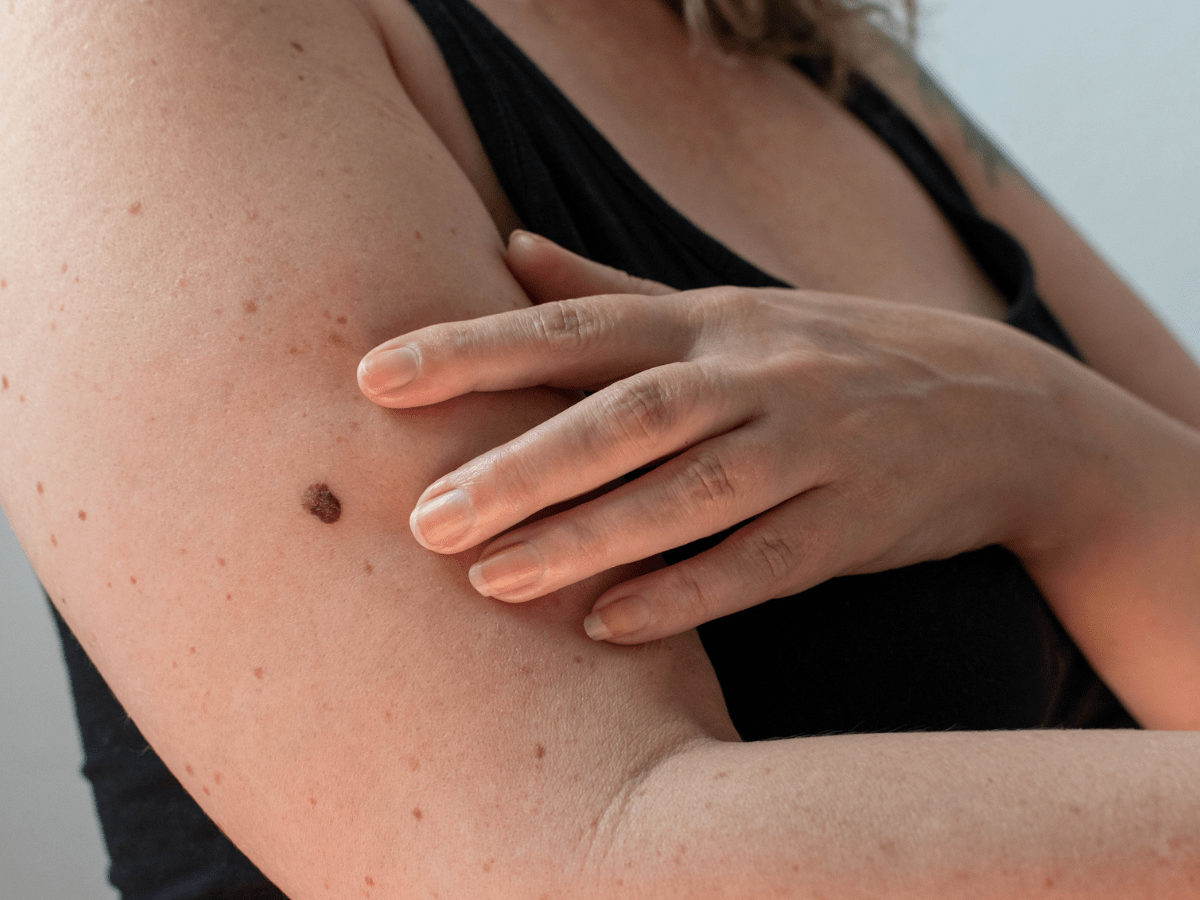What is Skin Cancer?
Skin cancer is the most common of all cancers. It affects more than two million Americans each year, and the numbers are on the rise. Skin cancer is the easiest cancer to cure, as long as it is diagnosed and treated early. If skin cancer is not treated early it can lead to disfigurement and even death.
Each year there are more new cases of skin cancer than the combined incidence of cancers of the breast, prostate, lung and colon.
One in five Americans will develop skin cancer in the course of a lifetime.
Types of Skin Cancer
- Actinic Keratoses (AKs)
Scaly, crusty growths caused by damage from the sun’s UV rays. They are often elevated or rough in texture.
- Basal Cell Carcinoma
Most common type of skin cancer, appears on skin exposed to the sun, such as the face, scalp, neck, hands, and arms.
- Malignant Melanoma
Develops from the pigment-producing cells (melanocytes) in the skin and can grow quickly and spread to other parts of the body.
- Squamous Cell Carcinoma
A common type of skin cancer that typically appears on sun-exposed skin because of increased UV ray exposure.
CAUSES
Skin cancer is the uncontrolled growth of abnormal skin cells. It occurs when unrepaired DNA damage to skin cells triggers mutations, or genetic defects, that lead the skin cells to multiply rapidly and form malignant tumors. This DNA damage is most often caused by ultraviolet radiation from sunshine or tanning beds.
RISK FACTORS
Anyone can get skin cancer, even those who have skin of color. Most people who get skin cancer, however, have lighter skin. People who are more likely to get skin cancer:
- Excessive time spent in the sun
- Use tanning beds or sun lamps
- Resided in an area that gets intense sunlight, such as Florida, the Caribbean, or northern Australia.
Any length of exposure, even if it occurred years ago or was short, increases your risk.
There are also some general characteristics which may increase a person’s risk for getting skin cancer, which include:
- A person’s skin type and the moles on one’s skin
- Family history of skin cancer
- Medical history
- Exposure to chemicals
- Tobacco
SYMPTOMS
The most common warning sign of skin cancer is a change to your skin. And the most common change is something growing on your skin. This growth can appear on the skin in many ways.
DIAGNOSIS
To diagnose skin cancer, a dermatologist looks at the skin. A dermatologist will carefully examine growths, moles, and dry patches.
To get a better look, a dermatologist may use a device called a dermatoscope. The device shines light on the skin. It magnifies the skin. This helps the dermatologist to see pigment and structures in the skin.
If a dermatologist finds something that looks like skin cancer, the dermatologist will take a sample of all or part of the suspicious skin. and the sampled skin will be sent to a lab where it can be examined under a microscope. A biopsy should not cause anxiety. The discomfort and risks are minimal.
FAQs
What does SPF mean?
SPF means “Sun Protection Factor.” It is a measure of how well the sunscreen protects you from harmful UV rays from the sun. Sunscreen must be re-applied every two to three hours, even if it has a high SPF number. Adults and children should always wear at least SPF 15.
What SPF is needed to prevent skin cancer?
To lower the chance of skin cancer, adults and children should always wear at least SPF 15.
Do tanning beds cause skin cancer?
Recent research says that yes, tanning beds can cause cancer. The World Health Organization strongly urges all people to avoid using tanning beds, especially those under the age of 18.
Are there different types of skin cancer?
There are different types of skin cancer. Each type is named after which type of cell it begins in. The three most common types of skin cancer are melanoma, basal cell carcinoma, and squamous cell carcinoma.
How can I tell if I have skin cancer?
Only a doctor can tell if you have skin cancer. Be sure to talk to your doctor if you notice any unusual moles, bumps, or red patches, or if you notice a change in any moles you already have. It may be a good idea to perform a monthly self skin check. Talk to your doctor if you notice any new moles, bumps or rough patches that are unusual, or if you notice a change in any you already had. Things to look for include: changes in any moles, bumps, or rough patches, moles with a dark color (blue, black, purple, green, etc), moles that are not the same color or shade throughout, moles with irregular/wavy borders, moles that are asymmetrical (one side looks different than the other side), moles that are bigger around than the eraser on the top of a pencil, or spots that itch or bleed.
Do I have a higher chance of getting skin cancer if a family member had it?
If a family member had skin cancer, you may have a higher chance of getting it. Some things, such as skin type, environment, and lifestyle are similar among family members.
If I have BCC, am I at greater risk of developing other skin cancers?
Yes. Studies show that people who have one skin cancer are at greater risk of developing another skin cancer. Perform regular skin self- examinations, and protect your skin every day. Be sure to keep all appointments with your dermatologist, and make an immediate appointment if you notice anything changing, itching, or bleeding on your skin.
Can anyone get BCC?
Yes. People of all skin colors can get BCC, although it is much more common in light skinned people.
How can I prevent AKS?
Daily sun protection is an important part of skin cancer prevention. The following are some of The Skin Cancer Foundation’s list of prevention tips:
• Seek the shade, especially between 10 AM and 4 PM.
• Do not let your skin burn.
• Avoid tanning and never use UV tanning beds.
• Cover up with clothing, including a broad-brimmed hat and UV-blocking sunglasses.
• Use a broad spectrum (UVA/UVB) sunscreen with an SPF of 15 or higher (most dermatologist recommend 30 or higher with zinc) every day. For extended outdoor activity, use a water-resistant, broad spectrum (UVA/UVB) sunscreen with an SPF of 30 or higher (again, most dermatologist recommend a higher SPF, of 50 or higher if planning on being outside).
• Apply 1 ounce (2 tablespoons, or 1 shot glass) of sunscreen to your entire body 30 minutes before going outside. Reapply every two hours or immediately after swimming or excessive sweating.
If I have SCC, am I at greater risk of developing other skin cancers?
Yes. Studies show that people who have one skin cancer are at greater risk of developing another skin cancer. Perform regular skin self- examinations, and protect your skin every day. Be sure to keep all appointments with your dermatologist, and make an immediate appointment if you notice anything changing. itching, or bleeding on your skin.
What is melanoma?
Melanoma is the most deadly type of skin cancer. It can take many shapes and appearances. Melanoma is usually a dark color like brown, blue, or black. Other signs to look for include: irregular borders, asymmetry (one half looks different than the other half), and size – melanomas are usually large (bigger than a pencil eraser)
Visit Chevy Chase Cosmetic & Dermatology Center
Our team provides thoughtful, expert care for all your skin health needs. We are proud to offer the most advanced general and cosmetic dermatology services in the greater Washington D.C. area. Your best skin awaits.


